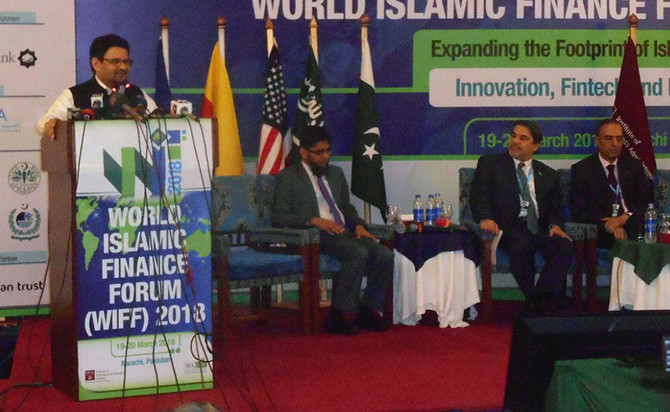KARACHI: The government of Pakistan is planning to issue Islamic bonds worth Rs100 billion ($900 million) by the end of the current government’s tenure, the opening session of the World Islamic Finance Forum 2018 has heard.
Dr. Miftah Ismail, adviser to the prime minister on finance, revenue and economic affairs, also revealed that a scheme enabling Pakistanis to bring US dollars from abroad and declare the assets will be launched this month.
Ismail said that for the first time in 10 years, Pakistan is on course to achieve growth in gross domestic product of six percent by the end of the fiscal year.
“Despite structural, political, and law-and-order problems, the government is able to achieve this growth rate,” Miftah said.
Responding to requests from the Islamic-banking sector, Ismail said he would create a post at the Ministry of Finance to exclusively deal with the Islamic-finance industry.
“I will soon convene a meeting of a committee for the implementation of the recommendations of the Steering Committee for Promotion of Islamic Banking in Pakistan”, he said.
He also pointed out that 12,000 megawatts had been added to the country’s electricity supply network after years of power shortfalls.
“Some of the problems are now things of past, including power deficit, as the government has added electricity, something that was not done during past 66 years of history of the country,” said Ismail.
As expected, he said there would be no new taxes introduced in the upcoming federal budget, saying the aim of government would be to “maximize growth, not to maximize revenue.”
The government will abolish three or four taxes based on “the good suggestions of stakeholders,” he revealed, adding that many taxes are not benefiting the government in terms of income, but are being used as a way to harass taxpayers.
Ismail described the overall health of economy as absolutely fine.
“The government is taking steps to curtail the current account deficits, which are expected to be tamed in the next year,” he said. “Imports are expected to slow down because of the machinery being imported for production purpose.”
Foreign-exchange reserves at the central bank will remain at $12.5 billion at the end of the fiscal year (June 30, 2018).
Pakistan needs to achieve growth of eight to 10 percent to generate employment for young people, Ismail said, adding that the federal government is lacking the resources to spend much on development, forcing the government to borrow.
“Federal government gives 60 percent of resources to the provinces, and after paying pension and debt servicing the government starts with a deficit — that is why we are forced to borrow,” he said.
Ismail also stressed the need for the construction of dams, otherwise the country would face “water load shedding” — restrictions in the supply.
Earlier, Jameel Ahmed, the deputy governor of State Bank of Pakistan, stressed the importance of modernizing Islamic banking to help alleviate poverty.
“The Islamic banking industry needs to come up with modern financial products,” he said, calling for introduction of facilities based on modern financial technology.
Shaikh Ebrahim Bin Khalifa Al Khalifa, chairman of the board of trustees of the Accounting and Auditing Organization for Islamic Financial Institutions, spoke about the progress of Islamic banking and standardizations being implemented globally to strengthen Islamic financing. Pakistan has the capability to play a leading role in the expansion of Islamic finance, he added.
The two-day World Islamic Finance Forum, which began on March 19 at the Movenpick Hotel in Karachi, is organized by IBA Center for Excellence in Islamic Finance, with the theme of “Expanding the Footprint of Islamic Finance: Innovation, Fintech and Regulations.”
The speakers include renowned local and international academics and leading industry figures, who have gathered to generate innovative ideas to stimulate the growth of Islamic Finance growth and overcome challenges.
World Islamic Finance Forum hears of Pakistan’s economic plans and progress
World Islamic Finance Forum hears of Pakistan’s economic plans and progress











